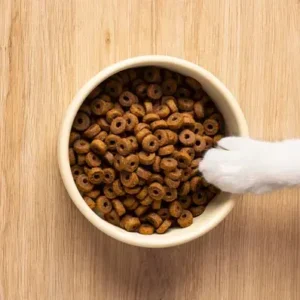How to Safely Feed Watermelon to Your Dog
To ensure your dog enjoys watermelon safely, follow these preparation tips:
- Remove the Seeds: Watermelon seeds can be a choking hazard and may cause digestive upset, so always remove them before serving.
- Avoid the Rind: The tough rind can be hard for dogs to digest and might cause choking or an upset stomach. Only give your dog the fleshy, red part of the fruit.
- Cut into Small Pieces: For ease of eating and to avoid choking, cut the watermelon into small, bite-sized cubes, especially if your dog is small.
- Serve in Moderation: While watermelon is healthy, it’s best to keep it as an occasional treat, not a daily snack.
Health Benefits of Watermelon for Dogs
Watermelon isn’t just a tasty treat. It offers several health advantages that make it a beneficial addition to your dog’s diet when served appropriately.
Hydration: Watermelon is about 92% water, making it a great way to keep your dog hydrated, especially during the summer months.
Low in Calories and Fat: Watermelon is a low-calorie fruit, making it a guilt-free treat for dogs maintaining a healthy weight.
Packed with Vitamins: Watermelon contains vitamins A, B6, and C, which are great for your dog’s immune system and overall health.
Risks to Consider
While watermelon can be a healthy snack, it’s essential to be aware of potential risks to keep your dog safe and avoid any unpleasant surprises.
- Choking Hazard: The rind and seeds of the watermelon can be dangerous if ingested. Be sure to remove them before giving the fruit to your dog.
- Stomach Upset: Like any new treat, watermelon can cause digestive issues if overfed. Always introduce new foods gradually and in moderation.
Nutritional Value of Watermelon for Dogs
Both red and yellow watermelons are safe and nutritious for most puppies and adult dog breeds. However, it’s best to avoid feeding watermelon to dogs with diabetes, sensitivities to sugar, or obesity, as it contains natural sugars.
Watermelon is a low-calorie fruit with no fat or cholesterol. It is made up of 92% water, making it an excellent source of hydration. This makes it especially beneficial for dogs on hot summer days.
However, because only small amounts of watermelon are recommended as a snack, it shouldn’t be relied on as a primary source of hydration.
Watermelon also offers several beneficial vitamins and minerals, including:
- Vitamin A
- Vitamin B6
- Vitamin C
- Potassium
How Much Watermelon Can I Give My Dog?
While watermelon is a healthy, hydrating treat for dogs, it’s important to keep portions moderate. Even healthy treats should only make up about 10% of your dog’s overall diet, with the remaining 90% coming from a portion of well-balanced dog food.
Here are some general guidelines to help you determine a safe serving size for watermelon based on your dog’s weight.
- Extra-Small Dogs (2-20 lbs.) – 1-2 slices Examples: Yorkie, Chihuahua, Pomeranian, Pug
- Medium Dogs (31-50 lbs.) – 5-6 slices Examples: Basset Hound, Border Collie, Australian Cattle Dog, Croatian Sheepdog
- Large Dogs (51-90 lbs.) – A small handful of watermelon slices Examples: Dalmatian, German Shepherd, Weimaraner
- Extra-Large Dogs (91+ lbs.) – A large handful of watermelon slices Examples: Bernese Mountain Dog, Saint Bernard, Central Asian Shepherd Dog
Signs of Overeating Watermelon
Although watermelon is a healthy treat, overeating can lead to discomfort or digestive issues. Keep an eye out for these signs that your dog may have had too much:
Watch out for the following signs that your dog may have overindulged:
- Decreased or loss of appetite
- Fatigue or low-energy
- Acting depressed or unusually sluggish
- Signs of discomfort, such as pacing or lying in unusual positions
- Excessive licking (of lips, the air, or objects)
If you notice any of these symptoms, contact your veterinarian for guidance, as they may suggest supportive care to help ease any digestive discomfort.
Monitor for Allergic Reactions
Whenever introducing a new food to your dog, keep an eye out for any signs of allergies or digestive issues, such as vomiting, diarrhea, or excessive drooling. If these symptoms occur, stop feeding your dog watermelon and consult your vet.
Alternatives to Watermelon for Dogs
While watermelon is a great occasional treat, it’s important to provide variety in your dog’s diet. Here are some other fruits that dogs can enjoy:
- Blueberries: Rich in antioxidants, dogs can eat blueberries to support brain health while enjoying a tasty, nutritious treat.
- Apples: Dogs can enjoy apples, which provide fiber and vitamin C. Just remember to remove the seeds before giving them to your pup.
- Bananas: Dogs can safely eat bananas, as they are rich in potassium and low in fat, making them a great treat for energy.
- Strawberries: Dogs can have strawberries, which are a low-calorie fruit full of fiber and antioxidants, making them both healthy and delicious.
Creative Watermelon Treat Ideas for Dogs
Watermelon can be a versatile and refreshing treat for your dog. Here are some unique ways to prepare it:
- Simple Slices: Cut the watermelon into small, seedless pieces, ensuring the rind is removed, and serve as a quick, healthy snack.
- Frozen Cubes: Freeze chunks of watermelon without seeds or rind for a chilled treat to help your dog beat the heat.
- Blended Pops: Blend watermelon into a smooth puree, pour it into molds or an ice cube tray, and freeze to create bite-sized frozen goodies.
- Frozen Watermelon Yogurt: Mix frozen watermelon with plain, unsweetened yogurt in a blender. Use it as a treat topper, fill a food puzzle toy, or serve on its own. If your dog can’t tolerate dairy, try using dairy-free yogurt or a safe, lactose-free option. Always check the label to avoid harmful additives like xylitol or added sugars.
Always ensure the fruits you offer are dog-safe, and remember to remove any seeds or pits, which can be dangerous for pets.
So, can dogs eat watermelon? The answer is yes!
Watermelon is a healthy, hydrating, and delicious treat that most dogs can enjoy in moderation. Just remember to remove the seeds and rind, cut them into small pieces, and monitor your dog’s reaction to this new food.
Keep watermelon as an occasional snack, not a staple of their diet, and you’ll provide your dog with a fun, refreshing treat.








